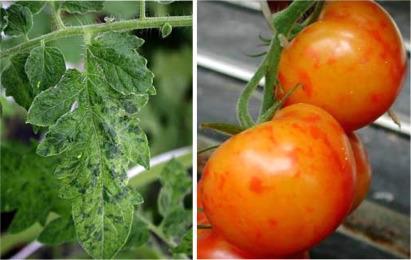The V10 vaccine to protect tomatoes against Pepino mosaic virus (PepMV) strains
The virulent Pepino mosaic virus (PepMV) is account to bling substantial losses in tomato production worldwide. The virus is very changeable and causes damaging symptoms such as stem or leaf necrosis, fruit discoloration, fruit cracking and size reduction. Transmission often occurs through plant sap when working tomato plants and by contact with infected materials like clothing and tools.
V10, a natural crop protection product developed by Valto and distributed by Koppert Biological Systems, is used to prevent the emergence of PepMV.
Kevin Vandevelde, the head of cultivation and manager of agricultural cooperative with tomato greenhouses Les Serres des Hauts de France, shared his experience managing the Pepino mosaic virus. He said that had used a different vaccine the previous season, but the first symptoms of the virus appeared on the plants in less than ten weeks and worsened in the middle of the season with symptoms on the fruits. The cooperative had to dispose a large quantity of produce. After that bad season, they decided to test the V10 vaccine.
“We applied V10 two days after the plants were set up in the greenhouses and have chosen to use the vaccine by rubbing one leaf per plant, using a sponge soaked in V10. This is quite a time consuming technique, but we consider it efficient. You can easily see the traces of application on the leaf, even three weeks later. This makes it easy to verify that all plants have been properly vaccinated. Furthermore, it guarantees even distribution of the product,” commented Mr Vandevelde. “It took us one and a half days to do half the first greenhouse, because it was the first time, but we were more efficient in the second greenhouse,” he added.
A box with everything needed for application is supplied with the V10. Here large and small buckets, strings for carrying the buckets, sponges, latex and cotton gloves, which makes things easier to organize.
Sampling tooks place four weeks after application. The technician from Coppert collects the leaves, following a very precise protocol, separats the samples into the plastic sachets provided, and sends them in a prepaid envelope, also supplied by Koppert.
“The samples were tested in a laboratory in the Netherlands. The results showed that the percentage of vaccinated plants was better in the first greenhouse than the second, but vaccine cover was sufficient in both cases. As the results from the second greenhouse were not as good, I decided to take another sample seven weeks after application, which showed better vaccine cover,” said Kevin Vandevelde.
In addition, he concluded that on average 85% of plants in the greenhouse were protected. He did not have any concerns about the Pepino Mosaic Virus this year and will reapply V10 next year.
At this moment, V10 received registrations for use in Canada, Denmark, Germany, France, Hungary, Italy, Austria, Poland, Czech Republic, UK and Sweden.
Koppert Biological Systems, with a head office located in the Netherlands, produces sustainable cultivation solutions for food crops and ornamental plants. The company has a holistic approach to plants and develops solutions for all the relevant elements. Among core disciplines: Resilient growth with NatuGro, Pest control, Natural pollination ,Application techniques & Monitoring Seed treatment.
More information about products and solutions of the company on their website.





